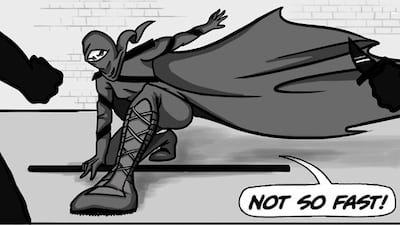The tipping point has come when it comes to sexual harassment – at least, that's what women across the world hope. The #MeToo movement that highlighted the deep-rooted problems in Hollywood was championed by A-list celebrities, women deemed beautiful and placed on a pedestal. Some say this is the reason that the campaign finally gained traction. While there's something to be said about how the suffering of white, establishment female celebrities was what was needed for things to finally start changing, there can be no regrets that people are starting to take note at last.
But what it also needs are ordinary heroines, so that billions of women around the world know this form of oppression and abuse must stop. We need to see them, hear their stories and believe they can get justice. And we need to believe it so we can proceed with energy through this revolution. That heroine has arrived in the form of a 23-year-old Egyptian, Rania Fahmy.
In August last year, Ms Fahmy was captured on camera retaliating against a man who sexually assaulted her. She was angry. Very angry. She was as angry as any woman who has ever been assaulted in this way. She refused to let him escape and hit him repeatedly with her handbag. The footage from a nearby shop, which captured him groping her and the ensuing chase as she ran after him and battered him with her bag, went viral.
Not only does her immediate response to him elicit admiration at her bravado and her own brand of self-empowered street justice, it's really what happened afterwards that makes us jump up and cheer. She reported him to police and last month, her attacker was convicted of sexual assault and sentenced to three years in jail. What is sadly an incredibly common and ordinary daily event for women, not just in Egypt but worldwide, turned into something quite different. At the moment Ms Fahmy took a stand and urged all women and girls to adhere to their rights and file complaints against sexual harassers, she became a superheroine walking in our midst. Our righteous anger at so much injustice against women and the disgusting and constant abuse was given an outlet and a sense of justice being restored. It also gave us hope. It was a moment that allowed us to step back and say, even though this is how it has always been, it doesn't need to be like that anymore. Things can change. Things must change. Things will change.
The superhero paradigm is one in which Muslim women in particular have been exploring and throwing off traditional constraints to find new ways of expression and of challenging hostile voices. Once you take out the parameters of ordinary life, anything is possible. So it's no surprise that Muslim women are adopting this new form to explore the potential of breaking new ground. The most famous of these is Kamala Khan, the recent reinvention of Ms Marvel as a Pakistani-American Muslim teenager. The comic book starring her persona shot to No 1 on The New York Times bestseller list, not only because she struggles with the daily angsts we all face, but also because she explores what a Muslim woman could be and the lived daily reality of those experiences. She was created by two Muslim women, Sana Amanat and G Willow Wilson, who said they wanted her to "send out a message of positivity and love".
Meanwhile Pakistan's Burka Avenger, a cartoon superheroine created by Aaron Haroon Rashid, is a teacher by day and fights villains by night. The setting is reminiscent of the Taliban badlands, where girls' education is forbidden. Instead, she instils the value of education in her female pupils and teaches them to attack villains with their books. By night, she dons a long black cape and black burqa-like mask. In this outfit, we see her as a heroine, able to counter the traditional strictures facing women and tackle deep-rooted injustice.
Perhaps my favourite of all is a comic strip called Al Qahera. Although the creator says this is not in reference to Cario, there is something resonant about an art form that tackles misogyny in the country where Ms Fahmy's attack took place, which has been working hard to combat instances of sexual harassment, such as those witnessed in Tahrir Square in 2014. Al Qahera is a black-and-white comic where the woman swoops in to tackle misogyny. "I can hear the sound of misogynistic trash," she rails before challenging assaulters and abusers galore.
While the superhero comics might help us see the world in a different way, it is real-life heroines in our midst such as Ms Fahmy who show us change in our world is truly possible.
Shelina Janmohamed is the author of Love in a Headscarf and Generation M: Young Muslims Changing the World


